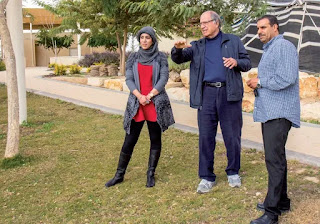THE ECOLOGICAL IMPERATIVE - ISRAEL
THE ECOLOGICAL IMPERATIVE – ISRAEL
The renewal of physical ties between the Land of the Bible and the
people of Israel have led, in recent generations, to a rediscovery of and
concern for the environment, and the ecological balance of the Land.
The Land of Israel, ancient and biblical, has a beautiful and
varied landscape with many distinct ecosystems: from the snow-capped Hermon and
volcanic plateau of the Golan Heights to the pristine coral reefs and majestic
mountains in Eilat; from the lush Galilee in the North to the Negev Desert in
the South; from the Hula Valley wetlands of the River Jordan to the Savannas of
the Arava Desert; and from the sandy Mediterranean Coast to the limestone
mountains of Jerusalem. All are vital to a delicate natural balance. Israel is
blessed with a wide array of biodiversity. It is home to some 2,800 species of
plants, more than 500 species of birds and 100 species of mammals.
Located along the African-Eurasian flyway, Israel hosts over 500
million migrating birds twice each year. Israel is designated as a biodiversity
hotspot where focused international conservation efforts will have the greatest
effect.
The “Society for the Protection of Nature in Israel” is Israel's
oldest and largest environmental non-profit organisation. Established as early
as 1953, the SPNI has been dedicated to protecting and preserving Israel's
natural resources, environment, biodiversity and unique landscape. The work
carried out by SPNI now will determine what the land of Israel will look like
for generations to come.
Israel has reached a critical point in its development. A tiny
country with a growing population, Israel’s remaining open spaces are
increasingly under threat of development. SPNI is working tirelessly with
policy makers and with the public, in schools, youth groups and communities all
over the country to create a sustainable future for Israel in the 21st Century.
In its search for sustainability and animal welfare, Israel has
initiated many projects.
A good example for
sustainable development, is the Project Wadi Attir - the brainchild of Dr,
Ben-Eli, the Israeli-born initiator and founder of the project. The Project’s
primary objective is to preserve and nurture traditional Bedouin agricultural
know-how. Less than a decade ago the site chosen was a barren, degraded
dryland, populated mainly by scorpions. Today, thanks to a unique method of
harvesting rainwater and planting, the area has been completely restored. There
are thousands of trees and flowering plants, fields of crops and native herbs,
a thriving sheep and goat dairy with the most advanced milking facilities in
Israel.
If Israel desires a
Land with open spaces, diverse wildlife, running streams of spring water, clean
air, an Israel that its’ grandchildren will be able to enjoy, it is imperative to
invest now. For the sake of the future, “it is not incumbent upon you to
complete the work, but neither are you at liberty to desist from it” (Ethics of
Our Fathers 2:21).



Comments
Post a Comment